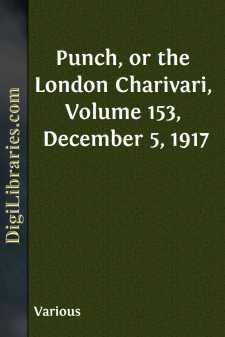Categories
- Antiques & Collectibles 13
- Architecture 36
- Art 48
- Bibles 22
- Biography & Autobiography 813
- Body, Mind & Spirit 142
- Business & Economics 28
- Children's Books 15
- Children's Fiction 12
- Computers 4
- Cooking 94
- Crafts & Hobbies 4
- Drama 346
- Education 46
- Family & Relationships 57
- Fiction 11828
- Games 19
- Gardening 17
- Health & Fitness 34
- History 1377
- House & Home 1
- Humor 147
- Juvenile Fiction 1873
- Juvenile Nonfiction 202
- Language Arts & Disciplines 88
- Law 16
- Literary Collections 686
- Literary Criticism 179
- Mathematics 13
- Medical 41
- Music 40
- Nature 179
- Non-Classifiable 1768
- Performing Arts 7
- Periodicals 1453
- Philosophy 64
- Photography 2
- Poetry 896
- Political Science 203
- Psychology 42
- Reference 154
- Religion 513
- Science 126
- Self-Help 84
- Social Science 81
- Sports & Recreation 34
- Study Aids 3
- Technology & Engineering 59
- Transportation 23
- Travel 463
- True Crime 29
Punch, or the London Charivari, Volume 153, December 5, 1917
by: Various
Categories:
Description:
Excerpt
MILLIE AND THE "KAYSER."
Millie is a "daily help." Who it is that she helps—whether herself or her employer—I am not in a position to say, for I am only temporarily a lodger in the house where Millie helps, and she doesn't help me much. But to-day I have made her hear and understand one whole sentence. It is the first time during the six days that we have known each other that I have conveyed anything to her except by graphic gesticulation and grimace.
I accepted the fact at the outset that my soft and seductive tones could never penetrate Millie's stone-deafness. Only the loudest and angriest remarks are audible to Millie, so I preserve an attitude of silent facial amiability in all my relations with her.
BALAAM could not have looked more surprised than did Millie this evening when, in the act of clearing away my latest meal, she heard me say, "Leave the matches."
She stopped dead and looked at me over the tray of dirty crockery. Her expression was not unfriendly.
"But I got t' look after myself," she explained; "I'd be all done up if I hadn't they matches in the morning to light the fire and all. You wouldn't get no bath-water."
"I want to smoke," I said obstinately.
She kept her hand over the box of matches. She had not heard. I made intelligent signs illustrative of the lighting of a cigarette. Millie told me, in pure Cornish:
"You can only get a box at a time now, and half-a-pound o' sugar I gets when I shows my card, and they do say we won't get that—only quarter soon. I'd like to get at that KAYSER! I'd smash him up, I would!" She said this in the kindest, most benign way, with a smile as nearly caressing as a smile without front teeth can be. "He'd come short off if I got to him! And he deserves it, I'm sure," she concluded, as she departed—with the matches....
A long walk over the Cornish cliffs in the gusty North wind from the Atlantic had made me drowsy, and as I sat before the fire my thoughts wandered from Russian politics and the Italian situation to Millie—and the "KAYSER": Millie, who was short of stature and round-backed, who showed her fifty-odd years unflinchingly to the world; Millie with her felt slippers and her overall and coarse hands; Millie, the possessor of a sugar-card—and the mighty War Lord, stern and implacable, trying to subdue the world to his will. And Millie only wished she could get near him to smash him up—"the KAYSER would come short off."...
The lamp-lit cottage room faded; the sound of November winds and swirling leaves outside died away. For a moment I peered through a greyish-blue moving mist—it might have been cigarette smoke; gradually I distinguished forms and colours beyond; then the fog lifted and I looked upon an electrically-lighted room, with the aspect of an office de luxe. There were telephones and file cases, typewriters and all the appurtenances of business operations; the furniture was massive and handsome, and carpets and hangings had every appearance of magnificence and costliness.
I knew without thought that this was the private room of WILHELM of Prussia....












